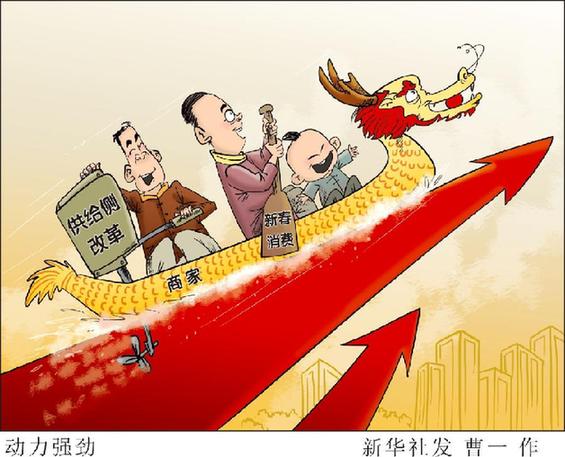當(dāng)前位置: Language Tips> Focus 專題> 2016雙語看兩會> 雙語兩會
分享到

Almost no one eats there any more and it's not making any money: the last remaining noodle bar outside Yunfeng steel plant cannot be long for this world. It seems destined to the same way as other small shops in the same area that have already shut.
運豐煉鋼廠外最后一家面館瀕臨倒閉:沒幾個人光顧那里,也賺不到錢。這家面館似乎無法逃脫該地其它小商鋪最終停業(yè)的命運。
"The steel plant is running at a loss. Some contracted laborers have been laid off," said the eatery owner. The Yunfeng works in north China's Hebei Province has cut its labor force from from 1,800 in its prime years to about 800.
“鋼鐵廠現(xiàn)在是虧本營運,有些合同工都被解聘了,”面館老板說道。運豐煉鋼廠位于中國河北省,目前員工已由前些年的1800名裁減至800左右。
Yunfeng's home city of Wu'an, 400 km south of Beijing, once had 18 iron and steel plants. Many have slashed production, to survive the bitter winter of the industry; some have closed their doors for good.
運豐位于武安市,距離其北部的北京400千米,曾經(jīng)擁有十八座鋼鐵廠。為了熬過最艱難的時刻,其中許多廠子都削減了生產(chǎn)量,有的甚至直接關(guān)門大吉。
Hebei, the country's leading iron and steel producer, is struggling to cut capacity in iron and steel, cement, and glass, planning to cut iron and steel capacity by 18 million tonnes this year.
河北是中國鋼鐵業(yè)的領(lǐng)跑者,而如今卻不得不大力削減鋼鐵、水泥和玻璃的生產(chǎn)量——該省今年計劃要將鋼鐵產(chǎn)量削減1800萬噸。
MAGIC BULLET 妙招制勝
Last year, policymakers came up with supply-side structural reform as the latest magic bullet to deal with a number of industrial ills by cutting overcapacity, destocking, deleveraging, reducing costs and identifying growth areas.
去年,為了應(yīng)對一系列工業(yè)弊病,中央決策者提出了供給側(cè)結(jié)構(gòu)性改革方案,去產(chǎn)能、去庫存、去杠桿、降成本、補短板。
Supply-side structural reform will be a key word at this year's "two sessions" -- the annual gatherings of the national legislative and political advisory bodies, analysts predict.
分析家預(yù)測,供給側(cè)結(jié)構(gòu)性改革將是今年全國兩會上的熱點——兩會是中國立法機構(gòu)和政治協(xié)商機構(gòu)一年一度的重大會議。
China's growth prospects this year are the subject of global concern.
中國今年的發(fā)展前景受到了全球的關(guān)注。
"I believe China will realize 6.5 percent or better GDP growth in 2016, a difficult feat, given the unstable global economy," said Shlomo Maital, professor with Technion -- Israel Institute of Technology.
“我認為,2016年中國的國內(nèi)生產(chǎn)總值(GDP)增速將達6.5%,這在動蕩的國際經(jīng)濟背景下是難得的好成績,”以色列理工學(xué)院的什洛莫·邁特爾教授說道。
China saw a record number of startups in 2015, with 4.44 million companies established, up 21.6 percent from 2014.
2015年是中國史上創(chuàng)業(yè)高峰年,一共新成立了444萬家公司,較之2014年增長了21.6%。
"Today, China too is in a startup boom. China, like Israel, can become a startup nation," said Maital. "Part of the Chinese dream can be a dream about starting your own business."
“中國正在涌起創(chuàng)業(yè)創(chuàng)新的熱潮。與以色列一樣,中國也可以成為創(chuàng)業(yè)的國度。”邁特爾說道,“‘中國夢’也包含‘創(chuàng)業(yè)夢’。”
According to Maital, to avoid the middle-income trap, China will need to raise its "total factor productivity", which demands innovation, working smart, new ideas and improvements, not more use of resources.
邁特爾認為,中國要避免“中等收入陷阱”,需提升全要素生產(chǎn)率,而這離不開創(chuàng)新、新理念、高效工作和技術(shù)進步,而不是過度消耗資源。
SHEEP AND GOATS 合理分配
China plans to take another 70 million people out of poverty in the next five years.
中國計劃在接下來的五年實現(xiàn)7000萬人脫貧。
Visiting Shenshan, a village in Jiangxi Province, early in February, President Xi Jinping said, "Not a single family living in poverty is to be left behind on our path to ending poverty."
二月初,習(xí)總書記在江西省神山村進行考察工作時提出:“在扶貧的路上,不能落下一個貧困家庭,丟下一個貧困群眾。”
Villager Zhang Chengde, 63, doubled his income to about 8,000 yuan (1,200 US dollars) last year by raising goats thanks to kids given as part of a poverty reduction campaign.
在政府扶貧政策的幫助下,63歲的神山村貧困戶張成德得到了一批小山羊,開始了山羊養(yǎng)殖,去年收入翻倍至8000元(1200美元)。
Zhang's son is 29 years old and remains a bachelor, partly due to poverty. He will not seek a job in cities this year, believing that helping his father expand the size of their herd will be more rewarding.
張成德的兒子今年29歲,尚未成家,一部分也是因貧困所致。他今年不打算進城找工作了,覺得幫父親擴大養(yǎng)殖規(guī)模更有前景。
PATH AND METHODS 途徑與方法
According to the proposal on the 13th Five-Year Plan, the quality of free trade zones (FTZ) will be improved and more FTZs set up.
“十三五”規(guī)劃建議提出,要提高自由貿(mào)易試驗區(qū)建設(shè)質(zhì)量,在更大范圍推廣復(fù)制。
Besides the four in the Shanghai, Tianjin, Fujian and Guangdong, all prosperous, coastal localities, a number of other provinces have unveiled FTZ applications.
目前,除了已設(shè)自貿(mào)區(qū)的上海、天津、廣東和福建這四個位于富庶沿海地區(qū)的城市,有多個省份也提出建設(shè)自貿(mào)區(qū)申請。
Liaoning Province in the northeast, said in its provincial 13th Five-Year Plan it will seek the approval for an FTZ in its port city of Dalian. The economy in Liaoning, part of the old industrial belt, only expanded 3 percent, the slowest at the provincial level, in 2015.
東北遼寧省的“十三五”規(guī)劃提出,積極爭取國家批準(zhǔn)設(shè)立大連自貿(mào)試驗區(qū)。由于位于老工業(yè)帶等原因,遼寧去年的經(jīng)濟增速僅為3%,在31個省區(qū)市中最低。
The interaction of the FTZs, the Belt and Road Initiative, the integration of Beijing, Tianjin and Hebei, among other strategies, will help produce a more balanced development and reshape the opening up policy.
同時,自貿(mào)區(qū)建設(shè)與“一帶一路”和京津冀協(xié)同發(fā)展等戰(zhàn)略的融合,也有望助推中國區(qū)域協(xié)調(diào)發(fā)展和塑造對外開放新局。
The "two sessions" will show how China perceives its path and the methods it will use to handle the challenges ahead. New governance concepts and strategies will also be widely illustrated across all agendas at the sessions this year.
兩會將展示中國處理當(dāng)前各挑戰(zhàn)的途徑與方法。此外,新的管理理念和管理策略也將成為今年兩會的各大議事日程上廣泛討論的議題。
China's shift from a low-wage manufacturing economy driven by exports and infrastructure investment to a medium-wage economy driven by services and consumption, is mainly driven by the growing middle class, said Maital.
邁特爾認為,中國從以對外出口和基礎(chǔ)設(shè)施投資為驅(qū)動力的低薪制造業(yè)經(jīng)濟體,成功轉(zhuǎn)型為以服務(wù)和消費為驅(qū)動力的中等收入經(jīng)濟體,這主要歸功于不斷擴大的中等收入群體。
"Global businesses are aware of China's huge and growing market and the new middle class. They are aware that China is one of the few markets in the world that are growing strongly," said the Israeli academic.
這位以色列學(xué)者說:“全球商業(yè)圈已經(jīng)認識到中國的市場和中等階層不容小覷,作為全球為數(shù)不多的強勁增長的巨大市場,中國未來的發(fā)展將給世界帶來更大機遇。”
英文來源:新華網(wǎng)
譯者:趙瀟逸
審校&編輯:丹妮
上一篇 : 李克強總理記者會金句速遞
下一篇 : 中國“兩會”為全球發(fā)展提供巨大契機
分享到
關(guān)注和訂閱


翻譯
關(guān)于我們 | 聯(lián)系方式 | 招聘信息
電話:8610-84883645
傳真:8610-84883500
Email: languagetips@chinadaily.com.cn